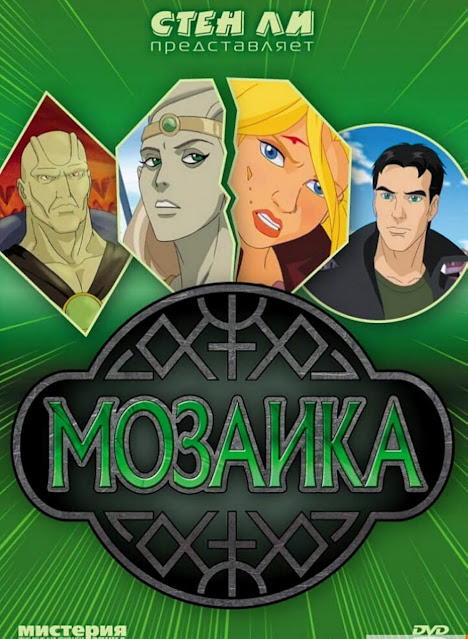PHENOMENALITY: *marvelous*
MYTHICITY: *fair*
FRYEAN MYTHOS: *adventure*
CAMPBELLIAN FUNCTION: *cosmological, psychological*
One source says that MOSAIC was the first of two animated films from Stan Lee's POW Entertainment, while IMDB says it debuted the year after THE CONDOR. I suppose the order of appearance does not matter, given that both projects proved underwhelming, though for opposite reasons. CONDOR, as my review should show, suffered from having too many plot-irons in the fire. MOSAIC, scripted by comics-pro Scott Lobdell from a Stan Lee concept, feels like it's so pleased by its one idea that it keeps repeating it over and over.
Maggie Nelson (voiced by Anna "Rogue" Paquin) is an aspiring actress in New York City, living with her widowed father and doted on by a poor young guy stuck in Maggie's "friend zone." The senior Nelson is an Interpol agent, and he's called in to investigate when a person or persons unknown try to steal a rare artifact from a museum. With comic-book logic, Nelson takes the artifact to his home, and somehow it ends up in Maggie's room. While the slightly scatterbrained young woman is talking to her pet chameleon about the similarity of chameleons and actors, lightning strikes her room. The room is undamaged but the strange powers of the artifact infuse Maggie. In a thrice she learns that she has gained a wealth of super-powers, including the ability to shapeshift into other forms. She can also adhere to walls, turn invisible, and has limited super-strength (enough, say, to life a grown man and tote him about).
A strange man gains entrance to the Nelson house, seeking the artifact. Maggie captures him, only to learn that his name is Mosaic and he has chameleon-powers just like hers, but he inherited them naturally. Mosaic belongs to a hidden race called the "Chameliels," who developed as a parallel species to homo sapiens. Maggie suspects that Mosaic was involved in the museum burglary, but the handsome-looking guy claims he's something like a "cop" for his people, pursuing the real culprit, whose name is Manikin. Clearly, in addition to riffing on Spider-Man and his notorious foe The Chameleon, Lee and Lobdell also took a page from the Lee-Kirby creation THE INHUMANS, in which the members of a parallel species all have superhero-sounding names like Triton, Medusa and Black Bolt.
So far, the Chameliels are no better or worse than dozens of other such super-endowed races. However, Lee and Lobdell drag out the additional trope of Magical Talismans That Can Do Basically Anything. The museum artifact is one of these, and Manikin has been seeking to gather other scattered Chameliel artifacts. His purpose is to restore the life of his long-dead wife "Facade" (yes, another weird name) so that she can help him conquer the world of the regular humans. Further, Manikin also kidnaps Nelson Senior, planning to use this random human cop as a sacrifice in his ritual.
So Maggie and Mosaic team up to track down Manikin, which involves using their chameleon powers to steal intel from Interpol. They butt heads with Agent Newell, a high-ranking official who might have become some sort of foil for Maggie had MOSAIC engendered either a sequel or a TV series. Eventually the two heroes are able to find Manikin's altar, interrupt the ritual, fight the villain, and rescue Nelson Senior. At a crucial moment Mosaic reveals that he is the son of Manikin, seeking to prevent his bad dad from doing bad things-- and then the two of them go over a cliff. As Maggie escapes with her father, she assumes that her partner is dead and she plans to honor his memory by using his real name as her superhero name-- though it's hard to see where a next installment would go from there.
Lobdell's script bends over backwards to make Maggie vivacious, charming, gutsy and intelligent. However, since the threat she and Mosaic must face seems very derivative, and far from compelling, a lot of the script comes off as pointlessly talky. There are a few OK fight-scenes, but nothing very memorable. The idea of a superhero who's also an aspiring actress has a slight novelty value, but Maggie's devotion to the thespian tradition never comes alive. The one thing I like about MOSAIC is a thing extrinsic to the script proper, and it relates to the history of Stan Lee's elaboration of the Marvel Universe. I've sometimes speculated that the reason Lee was so good at giving each major Marvel character his or her own "voice" was because as a young man he "trod the boards." Of course, over twenty years passed between Stan the Amateur Actor and Stan the Co-Creator of Marvel Comics. But I find it pleasant to think that the minor character of Maggie Nelson provides a window to some of the creative processes behind Stan Lee's achievement.

No comments:
Post a Comment